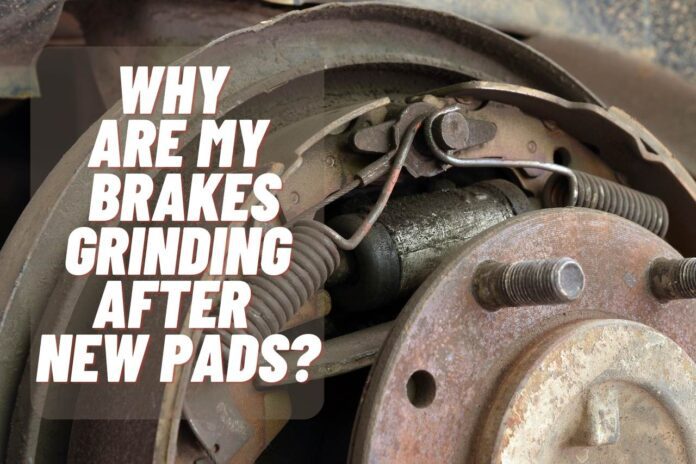Ignoring even the most minor sound or change in a component as crucial as your braking might result in costly maintenance in the future. More significantly, you and everybody in your vehicle will face an extremely stressful and hazardous scenario if your brakes malfunction while travelling. Of all the noises your brakes might produce, grinding often indicates that your braking system is experiencing a significant issue. Why are my brakes grinding after new pads?
When you’ve never experienced the brakes grind, they might seem frightening. There could be numerous typical causes for brake grinding. This guide will discuss what produces grinding noises and how to eliminate them.
Read more about the probable causes of brake grinding.
When you depress the parking brake, do your brakes make a loud whirring noise? If so, pay attention to it. You must check your brakes right away by making a call to your technician. It’d be advisable to identify the reason why your brakes are grinding. Driving on brakes that are grinding might result in a far worse situation. So let’s look at why are my brakes grinding after new pads.
Why are My Brakes Grinding After New Pads?
This guide will go over a few indications of this widespread issue and what you could do to address it if you think it may be affecting you.
Not Fully Compressed
Suppose the braking pad doesn’t get entirely squeezed if you use brand-new braking pads, and the crunching noise persists. If this is accurate, your brakes won’t be capable of transmitting the braking power to the rotor.
Thus, somewhat of smoothly transferring pressure as they must, the two pieces will scrape against one another as you use the brakes. It will result in a grating noise every time. Your braking pads must be firmly fastened to both faces of your disc for all four edges to exert pressure concurrently.
By doing it this manner, every time you press down on the pedal, the four sides are all simultaneously pulled inward, creating friction that instantly stops spinning! And which is how they can effectively perform their function.
Small Pads
The best course of action is to acquire new braking pads and discs that get made for your automobile, driving habits, and environmental circumstances. Doing this may lessen grinding and prevent your brake system’s two components from prematurely wearing out. It may indicate that the brake pads are too tiny for the rotor if you hear crunching in your brake pedal.
Anti-Rattle Clip
As you know, we advise swapping out your braking pads and discs in pairings. By doing this, you can be confident that your brake system is adjusted correctly and operating at peak efficiency. But sometimes, you could still hear crunching from your brakes even after applying brand-new pads and discs.
An anti-rattle clamp is most likely located on one of the rear edges of each braking system if this occurs after fitting new braking pads and discs. These clips could occasionally hinder the pad from being correctly installed onto the rotor. And it prevents the pad from sitting flush on its supporting plate and results in a rattling whenever the brake pedal gets used.
You’ve got a sticking calliper. A calliper is a hydraulic clamp that pinches onto each side of your braking system to force it up against the wheel as you depress the pedal. As soon as one of those clamps comes into contact with the braking pad and discs, it should fully release. Then, when the brake is pushed and released, it may result in an inconsistent braking action, producing grinding sounds. Checking the callipers is an excellent suggestion if you’ve just changed your braking pads and the grinding noise has returned.

Bad Rotors
You may have damaged rotors if the whirring noise intensifies or becomes more regular after installing new brake pads and discs. Examining the rotors for fractures, warping, and abrasive wear may help determine whether this is accurate. If these items are absent but you continue to experience crunching. At the same time, braking, there seems to be a risk that your brakes could be experiencing an additional issue. If any of those circumstances occur, you must replace your rotors.
- The braking pads and discs contact one another with metal.
- Your car does not fit the braking pads’ dimensions.
- There is an improper fit between the braking pads and the discs.
- The braking pads are a particular kind from those listed in your owner’s handbook. It causes them to wear out more quickly than they’d typically or don’t offer the necessary braking force and grip.
- The substitute braking system pads you now have get worn out; as a result, when you depress the braking pedal, they don’t hold as firmly as they must. Suppose there is even the slightest metal-on-metal contact when operating between the rotor and padding interface. In that case, this might result in severe grinding after placement.
Your brake grating issue will worsen if you neglect it. Avoid ignoring the grinding noise of the brakes when it occurs since the more you leave the problem unattended, the more costly it will be to remedy. There seems to be a significant likelihood that the brake calliper piston sealing has deteriorated if your brakes are crunching after installing new braking pads and discs. Over time, you’ll need to swap more components than the brake pads and discs.
Bottom Line
We hope this guide for Why are my brakes grinding after new pads have been helpful to you. Whenever your brakes start grinding, we understand that it could be frightening. Still, suppose you take the following procedures and have a mechanic examine them. In that event, we are confident they could address any concerns quickly. Or, at least you know how costly it may become if uncontrolled.
Here’s An Interesting Video,
VIDEO CREDITS: Auto V Fix YouTube Channel
Recommended for You: Similar Articles to Explore




